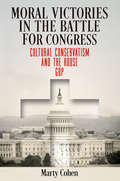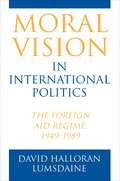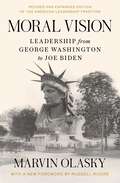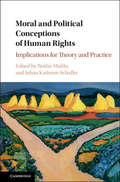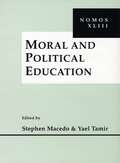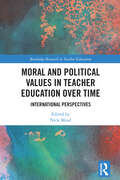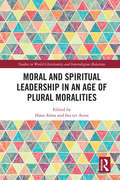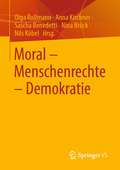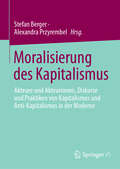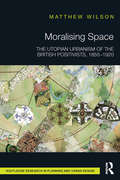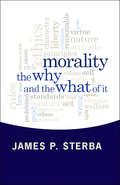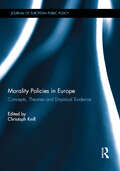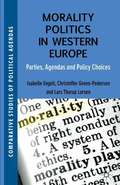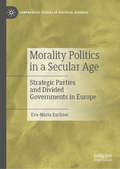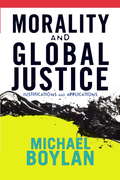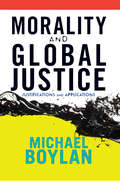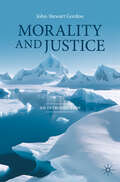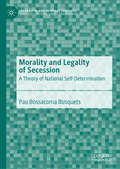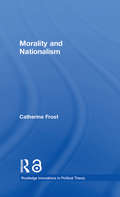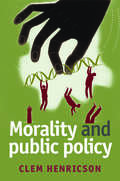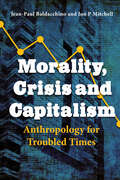- Table View
- List View
Moral Victories in the Battle for Congress: Cultural Conservatism and the House GOP (American Governance: Politics, Policy, and Public Law)
by Marty CohenWhile Christian conservatives had been active in national politics for decades and had achieved a seat at the table by working with the Republican Party, the 1980s and 1990s saw them make significant strides by injecting issues of moral traditionalism into U.S. House races across the country. Christian conservative activists worked diligently to nominate friendly candidates and get them elected. These moral victories transformed the Republican House delegation into one that was much more culturally conservative and created a new Republican majority. In Moral Victories, Marty Cohen seeks to chronicle this significant political phenomenon and place it in both historical and theoretical contexts. This is a story not only of the growing importance of moral issues but also of the way party coalitions change, and how this particular change began with religiously motivated activists determined to ban abortion, thwart gay rights, and restore traditional morality to the country.Beginning in the early 1980s, and steadily building from that point, religious activists backed like-minded candidates. Traditional Republican candidates, more concerned about taxes and small government, resisted the newcomers and were often defeated. As a result, increasing numbers of House Republican nominees were against abortion and gay rights. Voters responded by placing moral issues above their interests in economic policies, which led to the election of ever more socially conservative representatives. As a result, the House Republican caucus evolved from a body that advocated largely for low taxes and small government to one equally invested in moral and social issues, especially abortion and gay rights. The new moralistic Republican candidates were able to win in districts where traditional business Republicans could not, thereby creating the foundation for a durable Republican majority in the House and reshaping the American political landscape.
Moral Vision in International Politics: The Foreign Aid Regime, 1949-1989
by David Halloran LumsdaineCan moral vision influence the dynamics of the world system? This inquiry into the evolving foreign aid policies of eighteen developed democracies challenges conventional international relations theory and offers a broad framework of testable hypotheses about the ways ethical commitments can help structure global politics. For forty years development assistance has been the largest and steadiest net financial flow to the Third World, far ex- ceeding investment by multinational corporations. Yet fifty years ago aid was unheard of. Investigating this sudden and widespread innovation in the postwar political economy, David Lumsdaine marshals a wealth of historical and statistical evidence to show that aid was based less on donor economic and political interests than on humanitarian convictions and the belief that peace and prosperity could be sustained only within a just international order. Lumsdaine finds the developed countries adhered to rules that, increasingly, favored the neediest aid recipients and reduced their own leverage. Furthermore, the donors most concerned about domestic poverty also gave more foreign aid: the U.S. aid effort was weaker than that of other donors. Many lines of evidence--how aid changed over time, which donors contributed heavily, where the money was spent, who supported aid efforts--converge to show how humanitarian concerns shaped aid. Seeking to bridge the gap between normative theory and empirical analysis, Lumsdaine's broad comparative study suggests that renewed moral vision is a prerequisite to devising workable institutions for a post-cold war world.
Moral Vision: Leadership from George Washington to Joe Biden
by Marvin OlaskyWhat makes a leader truly great? Is it simply a matter of management style and personality? Or is it character that matters most? Moral Visions takes an insightful look into America&’s leaders of the past to answer these questions and demonstrates that values and moral convictions are critical to the strength of a nation.Supposedly, we learn about the candidates for the highest office through a series of tests called &“debates,&” which are instead an exchange of soundbites. We can&’t know whether an aspirant to the presidency has the ability to ask good questions or only a suave or belligerent ability to answer them. Moral Vision is a human-interest introduction to American history through studies of nineteen leaders: presidents, almost presidents, a tycoon, a crusading journalist, and even a leading 19th century abortionist. Its lessons can help voters sort through the candidates in 2024 and beyond by measuring them against previous leaders—none of whom was faultless. It shows how the deepest views often grow out of religious belief and influence political goals, racial prejudices, sexual activities, uses of power, and senses of service. In his 1789 inaugural address, George Washington pledged that &“the foundation for national policy will be laid in the sure and immutable principles of private morality.&” Marvin Olasky shows how 19th-century leaders like Thomas Jefferson, Andrew Jackson, and Grover Cleveland partly upheld and partly ignored that promise, and 20th-century leaders like Woodrow Wilson, John F. Kennedy, and Bill Clinton tried to &“compartmentalize&” the private and the public. An extensively updated version of The American Leadership Tradition, Moral Vision is for anyone tired of today&’s textbook tendencies to submerge the role of individuals as big economic and demographic waves roll in. History is more than statistics, economics, and group identities. Human beings are more than paper boats riding the rainfall into gutters.
Moral and Political Conceptions of Human Rights: Implications for Theory and Practice
by Reidar Maliks Schaffer Johan KarlssonIn recent years, political philosophers have debated whether human rights are a special class of moral rights we all possess simply by virtue of our common humanity and which are universal in time and space, or whether they are essentially modern political constructs defined by the role they play in an international legal-political practice that regulates the relationship between the governments of sovereign states and their citizens. This edited volume sets out to further this debate and move it ahead by rethinking some of its fundamental premises and by applying it to new and challenging domains, such as socio-economic rights, indigenous rights, the rights of immigrants and the human rights responsibilities of corporations. Beyond the philosophy of human rights, the book has a broader relevance by contributing to key themes in the methodology of political philosophy and by addressing urgent issues in contemporary global policy making.
Moral and Political Education: NOMOS XLIII (NOMOS - American Society for Political and Legal Philosophy #13)
by Stephen Macedo and Yael TamirWhat are the proper aims of education in a liberal democracy? Given the deep disagreement about moral and religious values in modern societies, what is the proper balance between public and private claimants to educational authority? Should parents be given greater control over their children's formal education? Are today's public schools promoting a culture of rootless individualism? Do we increasingly resort to prisons and punishment instead of schooling and moral education to control young people? And what, finally, should be the fate of the great project of racially integrated schooling: a project that energized a vast expenditure of hopes and resources in the latter half of the 20th century in America? Should we recommit ourselves to the ideal of integration, or should we embrace other, perhaps better, ways to help the disadvantaged and promote social integration? Should we go further, and affirm that predominantly black educational institutions have intrinsic benefits, such as preserving black culture and providing role models for black youngsters? As education reform takes center stage these questions are at the heart of what it means to be an American and participate in a democratic society. The essayists in this volume bring philosophical, political, and legal reflection to bear on the practical questions of how education should be changed to meet the needs of the twenty-first century. In so doing they display a determination to illuminate the educational choices that lie before all modern democracies. Contributors: Anita L. Allen, Lawrence Blum, Harry Brighouse, Randall Curren, Peter de Marneffe, James G. Dwyer, Christopher Eisgruber, William A. Galston, Amy Gutmann, Michael W. McConnell, Rob Reich, Nancy L. Rosenblum, Yael Tamir, John Tomasi, and Andrew Valls.
Moral and Political Values in Teacher Education over Time: International Perspectives (Routledge Research in Teacher Education)
by Nick MeadThis collection brings together international teacher educators to employ a ‘long view’ of an historic and values-based dialectic in teacher education. The authors reflect how employing historical consciousness to look back can offer greater continuity to teachers’ moral and political values within their training. The book draws on research from experienced teacher educators representing different historical, social and political contexts in North America, Europe, Asia as well in post-conflict South Africa. Within each section, the authors reflect on the development of the moral and political values of pre-service and in-service teachers in an era of global neo-liberalism and how this is inextricably bound up with the narratives of professionals in the past within their own national context. Each chapter takes a ‘long view’ of the role of historical consciousness in informing the moral and political values of preservice and in-service teachers, providing examples of how international teacher educators can collectively support one another in restoring a vibrant, values-based dialectic within the processes, pedagogies and provision of university and school-based training for which they are responsible. The ‘long view’ approach offers a compelling argument for the need to connect pre- and in-service teachers’ values and narrative to the legacy of professionals of the past. Moral and Political Values in Teacher Education over Time will be of great interest to researchers, academics and students in teacher education, comparative education and the history of education. It will also be of interest to international university and school-based teacher educators and policy-makers in the field.
Moral and Spiritual Leadership in an Age of Plural Moralities (Studies in World Christianity and Interreligious Relations)
by Ina Ter Avest Hans AlmaIn crisis situations, such as terror attacks or societal tensions caused by migration, people tend to look for explicit moral and spiritual leadership and are often inclined to vote for so-called 'strong leaders'. Is there a way to resist the temptation of the simplistic solutions that these ‘strong leader’ offer, and instead encourage constructive engagement with the complex demands of our times? This volume utilises relational and dialogical perspectives to examine and address many of the issues surrounding the moral and spiritual guidance articulated in globalizing Western societies. The essays in this collection focus on the concept of plural moralities, understood as divergent visions on what is a 'good life', both in an ethical, aesthetical, existential, and spiritual sense. They explore the political-cultural context and consequences of plural moralities as well as discussing challenges, possibilities, risks, and dangers from the perspective of two promising relational theories: social constructionism and dialogical self theory. The overarching argument is that it is possible to constructively put in nuanced moral and spiritual guidance into complex, plural societies. By choosing a clear theoretical focus on relational approaches to societal challenges, this interdisciplinary book provides both a broad scope and a coherent argument. It will be of great interest to scholars of social and political psychology, leadership and organization, religious studies, and pedagogy.
Moral – Menschenrechte – Demokratie
by Nina Brück Sascha Benedetti Nils Köbel Olga Rollmann Anna KirchnerDer Band konzentriert und fokussiert die Leitbegriffe Moral, Menschenrechte und Demokratie. Wie diese miteinander verwobenen sind und was sie zu gesellschaftlich und erziehungswissenschaftlich relevanten Kernthemen macht, wird in den Beiträgen zu den Themen Moral, Menschenrechte und Menschenwürdeverletzungen, Demokratiebildung sowie Partizipation analysiert und diskutiert.Eben diese thematische Breite und interdisziplinäre Ausrichtung zeichnet das Arbeiten und Forschen des Erziehungswissenschaftlers Professor Dr. Stefan Weyers aus, dessen wissenschaftliches Werk mit dieser Publikation gewürdigt wird.
Moralisierung des Kapitalismus: Akteure und Akteurinnen, Diskurse und Praktiken von Kapitalismus und Anti-Kapitalismus in der Moderne
by Stefan Berger Alexandra PrzyrembelDieses Buch fügt der wachsenden Literatur über die Geschichte des Kapitalismus einen entscheidenden Schwerpunkt auf die Moral hinzu, indem es soziale und kulturelle Perspektiven auf die kapitalistische Wirtschaftsordnung in der Moderne untersucht. Die Studie geht über die engen wirtschaftlichen Grenzen hinaus und zeichnet die Verflechtung zwischen moralischen Werten und Emotionen und dem Kapitalismus nach, wobei sowohl Kritik als auch Rechtfertigungen untersucht werden. Unternehmensinsolvenzen, Steuersysteme, Reichtum und das Geschehen an Börsen wurden aus moralischen Gründen, während Konzepte von wirtschaftlicher Gerechtigkeit und der Humanisierung des Kapitalismus die moralische Kritik überlagerten. Viele soziale Bewegungen, von der Sklavereigegnerschaft bis hin zur Arbeiterbewegung, wurden durch das Bestreben inspiriert, den Kapitalismus zu verbessern und den moralischen Verfall aufzuhalten, von dem große Teile der Gesellschaft betroffen waren. Dieses Buch geht der Frage nach, wie moralische Gefühle definiert werden und sich im Laufe der Zeit verändert haben, und wie sie sich sowohl auf den Kapitalismus als auch auf den Antikapitalismus beziehen. In Kapiteln wird anhand verschiedener sozialer Bewegungen und ethischer Fragen eine moralische Geschichte des Kapitalismus dargestellt, die nicht nur als Wirtschaftssystem, sondern als eine Ordnung verstanden wird, die alle Bereiche des modernen Lebens umfasst.
Moralising Space: The Utopian Urbanism of the British Positivists, 1855-1920
by Matthew WilsonAmidst the soot, stink and splendour of Victorian London, a coterie of citizen-sociologists set out to break up the British Empire. They were the followers of the French philosopher Auguste Comte, a controversial figure who introduced the modern science of sociology and the republican Religion of Humanity. Moralising Space examines how from the 1850s Comte’s British followers practised this science and religion with the aim to create a global network of 500 utopian city-states. Curiously the British Positivists’ work has never been the focus of a full-length study on modern sociology and town planning. In this intellectual history, Matthew Wilson shows that through to the interwar period affiliates to the British Positivist Society – Richard Congreve, Frederic Harrison, Charles Booth, Patrick Geddes and Victor Branford – attempted to realise Comte’s vision. With scarcely used source material Wilson presents the Positivists as an organised resistance to imperialism, industrial exploitation, poverty and despondency. Much to the consternation of the church, state and landed aristocracy they organised urban interventions, led ad hoc sociological surveys and published programmes for realising idyllic city-communities. Effectively this book contributes to our understanding of how Positivism, as a utopian spatial design praxis, heavily influenced twentieth-century architecture and planning.
Morality
by James P. SterbaThis collection of essays examines what morality requires of us and why we should even be moral. They are organized around Sterba's opening essay, which attempts to answer these questions by first of all arguing that we must be moral because we are rationally compelled, but by also advancing a number of positions from a libertarian perspective about egotism and altruism, negative liberty, welfare and equality. Each of essays not written by Sterba critiques a facet of his argument. They focus mostly on the rational underpinning of morality; moral skepticism; egotism, altruism and social cooperation; and how libertarianism does not lead to welfare and equality. Sterba responds to these critiques in a final essay. The other authors are professors of philosophy with specialties in moral thinking. Annotation ©2012 Book News, Inc. , Portland, OR (booknews. com)
Morality
by James P. SterbaThis book invites philosophers and their students to consider two of the most fundamental questions in moral and political philosophy: Why be moral? And, what does morality require? Distinguished philosopher James P. Sterba presents his unique views on these topics. Sterba first argues from rationality to morality and then from morality to substantial equality. Prominent scholars Charles W. Mills, Candace A. Vogler, Anita Superson, Russ Shafer-Landau, Allan F. Gibbard, Gerald Gaus, and Tibor Machan provide thought-provoking critical responses. In the final part, Sterba addresses these critiques, inviting readers to explore the various arguments and reach their own conclusions on these fundamental questions of moral and political philosophy. Morality: The Why and What of It is an essential text for all students and scholars of ethics and political philosophy.
Morality Policies in Europe: Concepts, Theories and Empirical Evidence (ISSN)
by Christoph KnillThe regulation of issues like abortion, euthanasia, gun control, same-sex unions, pornography, prostitution, drugs, or gambling is commonly referred to a special class of so called morality policies. The distinctive feature of these policies is that politics are shaped by conflicts over first principle: When does life end? When does it begin? Is gambling, drug consumption or prostitution inherently malignant? The regulation of these value conflicts entails decisions about "right" or "wrong" and hence the "validation of a particular set of basic values". Yet there is still a remarkable lack of scholarly attention on morality policies, in particular with regard to general implications for the study of public policy. To stimulate further research in this area, this book focuses on different concepts and theories of morality policy change in European countries. It is based on a broad and comparative empirical perspective on different morality issues, including, for instance, the regulation of prostitution, abortion, euthanasia, gambling, drugs, as well as gun controls.This book was published as a special issue of the Journal of European Public Policy.
Morality Politics in Western Europe
by Christoffer Green-Pedersen Lars Thorup Larsen Isabelle EngeliWhy do some countries have 'Culture Wars' over morality issues such as abortion and same-sex marriage while other countries hardly experience any conflict? This book argues that morality issues only generate major conflicts in political systems with a significant conflict between religious and secular parties.
Morality Politics in a Secular Age: Strategic Parties and Divided Governments in Europe (Comparative Studies of Political Agendas)
by Eva-Maria Euchner"Euchner’s carefully researched and cogently argued study of morality politics in Europe adds an outstanding piece of research to the ever growing literature on religion and politics. Its combination of quantitative and qualitative comparative analysis involving a novel data set and cross-policy perspectives demonstrates persuasively the role of religion as a resource for political action even in secularized societies."—Michael Minkenberg, Viadrina European University, Germany“Building upon the dichotomy between the “secular” and “religious” worlds of European morality politics, Dr. Euchner plumbs the empirical depths of four nations to unearth a compelling theoretical explanation for when value-laden conflicts surface in parliaments with a strong secular-religious party cleavage. This singularly important volume belongs in the institutional libraries and bibliographic collections of every serious student of public policy analysis, especially those of us who focus on morality policy.”—Raymond Tatalovich, Loyola University Chicago, USAThis book introduces a new theoretical framework from which to understand religion and morality politics in Europe. This framework provides a first—and rather provocative—answer to the general debate on how religion influences policy-making processes. Specifically, the book argues that religion is more a strategic resource for political parties than a fundamental normative doctrine shaping political parties’ policy-making behavior in a systematic and coherent way. The framework proposes a mechanism (i.e. wedge issue competition) that can be used to identify and explain the conditions under which issues related to religious values rise and fall in parliaments of the religious world in Europe and what consequences we may expect in terms of policy reforms.
Morality and Global Justice
by Michael BoylanBoylan (philosophy, Marymount U. , Virginia) presents this monograph on ethics from a globalist perspective. The work is divided into three sections covering the meta-ethical theories behind morality and global justice, normative ethics in a global context and applied examples of global ethical decision making. The volume includes case studies and each chapter provides reasoning exercises for a classroom discussion or writing prompts. Annotation ©2011 Book News, Inc. , Portland, OR (booknews. com)
Morality and Global Justice
by Michael BoylanIn this concise, single-authored text, renowned scholar and professor Michael Boylan examines the moral justifications underlying key global justice issues and provides students with the analytical tools to approach those issues critically. Introductory chapters establish a thorough but accessible foundation in theory and moral justification, and subsequent chapters apply those concepts to key areas of global concern: poverty; public health; race, gender, and sexual orientation; democracy and social/political dialog; globalization; the environment; war and terrorism; and immigrants and refugees. For easy reference and review, each chapter includes key terms, critical applied reasoning exercises (CARE), and problems and thought experiments perfect for class discussions or writing exercises. The appendix, "Getting Involved," guides students in putting ethical principles to work. An anthology of original essays, The Morality and Global Justice Reader, is also available as a complementary or a standalone text.
Morality and Global Justice
by Michael BoylanIn this concise, single-authored text, renowned scholar and professor Michael Boylan examines the moral justifications underlying key global justice issues and provides students with the analytical tools to approach those issues critically. Introductory chapters establish a thorough but accessible foundation in theory and moral justification, and subsequent chapters apply those concepts to key areas of global concern: poverty; public health; race, gender, and sexual orientation; democracy and social/political dialog; globalization; the environment; war and terrorism; and immigrants and refugees. For easy reference and review, each chapter includes key terms, critical applied reasoning exercises (CARE), and problems and thought experiments perfect for class discussions or writing exercises. The appendix, "Getting Involved,” guides students in putting ethical principles to work. An anthology of original essays, The Morality and Global Justice Reader, is also available as a complementary or a standalone text.
Morality and Global Justice: Justifications and Applications
by Michael BoylanIn this concise, single-authored text, renowned scholar and professor Michael Boylan examines the moral justifications underlying key global justice issues and provides students with the analytical tools to approach those issues critically. Introductory chapters establish a thorough but accessible foundation in theory and moral justification, and subsequent chapters apply those concepts to key areas of global concern: poverty; public health; race, gender, and sexual orientation; democracy and social/political dialog; globalization; the environment; war and terrorism; and immigrants and refugees. For easy reference and review, each chapter includes key terms, critical applied reasoning exercises (CARE), and problems and thought experiments perfect for class discussions or writing exercises. The appendix (Getting Involved) guides students in putting ethical principles to work.
Morality and Justice: An Introduction
by John-Stewart GordonThis textbook is an essential primer for philosophy students embarking on their journey into the field of ethics and political philosophy. It is meticulously structured to unfold the rich tapestry of ethical discourse in a manner that is both profound and accessible to undergraduate and graduate students alike. Each chapter begins with a brief introduction, followed by an in-depth exploration of ethical concepts, and concludes with thought-provoking study questions and a curated list of further readings.
Morality and Legality of Secession: A Theory of National Self-Determination (Federalism and Internal Conflicts)
by Pau Bossacoma BusquetsThis book explores secession from three normative disciplines: political philosophy, international law and constitutional law. The author first develops a moral theory of secession based on a hypothetical multinational contract. Under this contract theory, injustices do not determine the existence of a right to secede, but the requirements to exercise it. The book’s second part then argues that international law is more inclined to accept and advance a remedial right approach to secession. Therefore, justice as multinational fairness is to be fully institutionalized under the constitutional law of liberal democracies. The final part proposes constitutionalizing a qualified right to secede with the aim of fostering recognition and accommodation of national pluralism as well as cooperation and compromise between majority and minority nations.
Morality and Nationalism (Routledge Innovations in Political Theory #Vol. 19)
by Catherine FrostThis book takes a unique approach to explore the moral foundations of nationalism. Drawing on nationalist writings and examining almost 200 years of nationalism in Ireland and Quebec, the author develops a theory of nationalism based on its role in representation. The study of nationalism has tended towards the construction of dichotomies – arguing, for example, that there are political and cultural, or civic and ethnic, versions of the phenomenon. However, as an object of moral scrutiny this bifurcation makes nationalism difficult to work with. The author draws on primary sources to see how nationalists themselves argued for their cause and examines almost two hundred years of nationalism in two well-known cases, Ireland and Quebec. The author identifies which themes, if any, are common across the various forms that nationalism can take and then goes on to develop a theory of nationalism based on its role in representation. This representation-based approach provides both a basis for the moral claim of nationalism while at the same time identifying grounds on which this claim can be evaluated and limited. It will be of strong interest to political theorists, especially those working on nationalism, multiculturalism and minority rights. The special focus in the book on the Irish and Quebec cases also makes it relevant reading for specialists in these fields as well as for other area studies where nationalism is an issue.
Morality and Public Policy
by Clem HenricsonWith an increasingly bitter secular religious divide, there is a messy, defective relationship between the state and morality in the UK. In response, Morality and Public Policy puts forward proposals to enhance the capacity of public policy to respond more effectively to morality and associated shifts in social mores in different cultural settings. Spanning religion, moral philosophy and scientific understanding of the human condition, this unique book draws together and adds to the latest thinking on morality, its causes, mutations, tensions and common features. It challenges misplaced concepts of ‘moral progress’ and the supremacy of empathy, and puts forward the management of the full span of human impulses - some complementary, some conflicting - as the function of morality with major implications for the interface between morality and public policy.
Morality at the Ballot
by Daniel R. BiggersAcross the United States, there is wide variation in opportunities for citizens to craft legislation through the process of direct democracy. Previous studies suggest that an active role in policy making can spark political interest and engagement, encouraging individuals, who would otherwise abstain from voting, to turn out. Daniel R. Biggers challenges this contention, testing a new theoretical framework that details the exact circumstances under which any proposition might increase participation. Morality at the Ballot reveals that the ability of direct democracy to increase turnout is significantly more limited than currently thought, and that the propositions that do affect participation are restricted to a small subset of ballot issues that include morality policy. Biggers uses these morality propositions to demonstrate the conditions necessary for direct democracy to influence turnout, affect who votes, and shape electoral and policy outcomes. The investigation provides significant insights into the consequences of deciding policy via the ballot and expanding the role for citizens in the political process.
Morality, Crisis and Capitalism: Anthropology for Troubled Times
by Jon P. Mitchell Jean-Paul Baldacchino'May you live in interesting times’ was made famous by Sir Austen Chamberlain. The premise is that ‘interesting times’ are times of upheaval, conflict and insecurity - troubled times. With the growing numbers of displaced populations and the rise in the politics of fear and hate, we are facing challenges to our very ‘species-being’. Papers in the volume include ethnographic studies on the ‘refugee crisis’, the ‘financial crisis’ and the ‘rule of law crisis' in the Mediterranean as well as the crisis of violence and hunger in South America.
